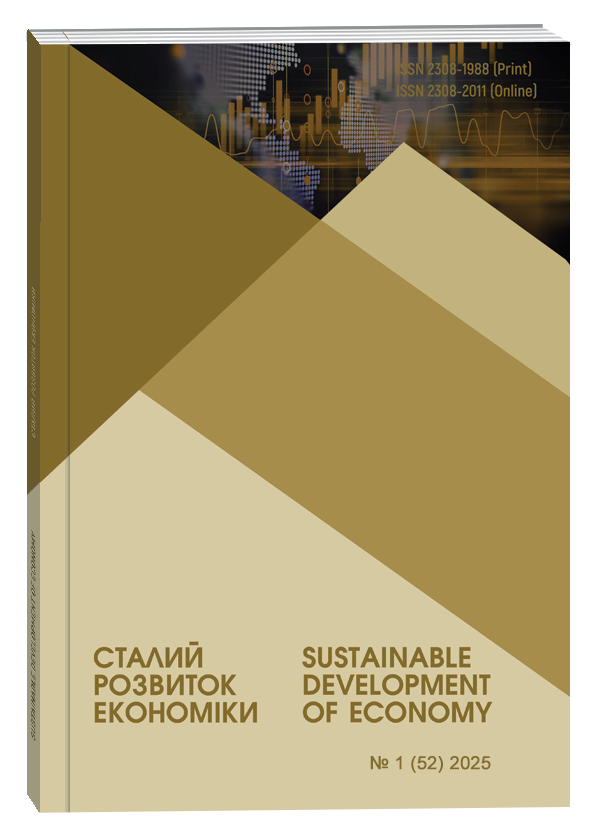PERSPECTIVES OF SUSTAINABLE DEVELOPMENT OF BUSINESS STRUCTURES THROUGH ENVIRONMENTAL TAXATION
Abstract
The article examines the role of environmental taxation in ensuring the sustainable development of business structures. It highlights the significance of environmental taxes as a regulatory tool aimed at reducing the negative impact of enterprises on the environment while encouraging them to adopt environmentally friendly technologies. The study emphasizes that effective environmental taxation not only generates additional budget revenues but also serves as a powerful incentive for businesses to minimize harmful emissions, optimize resource consumption, and implement innovative solutions. The article analyses the impact of environmental taxation on the investment strategies of enterprises, focusing on how tax policies influence corporate decisions regarding modernization, production optimization, and compliance with international environmental standards. Particular attention is given to the importance of ecological innovations as a key factor in sustainable business development. The study outlines various forms of ecological modernization, including energy-efficient technologies, the use of renewable energy sources, waste recycling, and digital solutions for environmental monitoring and control. A comparative analysis of international practices in environmental taxation demonstrates that countries such as Sweden and Germany have successfully implemented tax policies that incentivize businesses to reduce pollution and transition to sustainable production models. Meanwhile, in Ukraine, the effectiveness of environmental taxation remains limited due to insufficient tax rates and an inefficient distribution of collected funds. The article underscores the need for reforming the environmental tax mechanism to align with global best practices and strengthen corporate responsibility towards environmental protection. The authors propose key directions for enhancing the mechanism of environmental taxation and supporting ecological innovations. These include differentiated tax rates based on pollution levels, greater transparency in the allocation of tax revenues for environmental projects, and the development of financial support instruments for businesses investing in green technologies. The proposed measures aim to create a favourable environment for sustainable business development, enhance competitiveness, and contribute to long-term economic growth while ensuring environmental sustainability.
References
Канонішена-Коваленко К. Екологічний податок від А до Я. Київ : Фундація «Відкрите Суспільство», 2017. 108 с.
Новицька Н. Вплив екологічного оподаткування на активізацію фінансування природоохоронних витрат та впровадження екоінноваційних проєктів. Modeling the development of the economic systems. 2024. № 1. Р. 14–21. DOI: https://doi.org/10.31891/mdes/2024-11-2
Самко О. Проблеми та перспективи екологічного оподаткування в Україні. Проблеми і перспективи еко¬номіки та управління. 2023. № 1 (33). С. 184–197. DOI: https://doi.org/10.25140/2411-5215-2023-1(33)-184-197
Панченко О. Екологічне оподаткування в Україні: реалії та перспективи в умовах сталого розвитку. Економіка та суспільство. 2024. № 64. DOI: https://doi.org/10.32782/2524-0072/2024-64-63
Tsiantikoudis S., Galatsidas S., Paschalidou A., Zafeiriou E., Arabatzis G. Environmental taxes in the European Union and their use as a means of environmental restoration. IOP Conf. Series: Earth and Environmental Science. 2022. № 1123. DOI: https://doi.org/10.1088/1755-1315/1123/1/012091
Харченко Т.Б. Екологічна інноваційна діяльність як основа сталого розвитку. Вчені записки ТНУ імені В. І. Вернадського. Серія: Економіка і управління. 2021. Том 32 (71). № 1. С. 26-31. DOI: https://doi.org/10.32838/2523-4803/71-1-4
Kanonishena-Kovalenko K. (2017) Ekologichnyi podatok vid A do Ya [Environmental tax from A to Z]. Kyiv: Fundatsiya «Vidkryte Suspilstvo», 108 p. (in Ukrainian)
Novytska N. (2024) Vplyv ekolohichnoho opodatkuvannia na aktyvizatsiiu finansuvannia pryrodookhoronnykh vytrat ta vprovadzhennia ekoinnovatsiinykh proiektiv [The impact of environmental taxation on the activation of financing environmental protection costs and the implementation of eco-innovation projects]. Modeling the development of the economic systems, no. 1, pp. 14–21. DOI: https://doi.org/10.31891/mdes/2024-11-2 (in Ukrainian)
Samko O. (2023) Problemy ta perspektyvy ekolohichnoho opodatkuvannia v Ukraini [Problems and prospects of environmental taxation in Ukraine]. Problemy i perspektyvy ekonomiky ta upravlinnia, no. 1 (33), pp. 184–197. DOI: https://doi.org/10.25140/2411-5215-2023-1(33)-184-197 (in Ukrainian)
Panchenko O. (2024) Ekologichne opodatkuvannia v Ukraini: realii ta perspektyvy v umovakh staloho rozvytku [Environmental taxation in Ukraine: realities and prospects in the context of sustainable development]. Ekonomika ta suspilstvo, no 64. DOI: https://doi.org/10.32782/2524-0072/2024-64-63 (in Ukrainian)
Tsiantikoudis S., Galatsidas S., Paschalidou A., Zafeiriou E., Arabatzis G. (2022) Environmental taxes in the European Union and their use as a means of environmental restoration. IOP Conf. Series: Earth and Environmental Science, no 1123. DOI: https://doi.org/10.1088/1755-1315/1123/1/012091
Kharchenko T. B. (2021) Ekologichna innovatsiina diialnist yak osnova staloho rozvytku [Environmental innovation activity as the basis for sustainable development]. Vcheni zapysky TNU imeni V. I. Vernadskoho. Seriia: Ekonomika i upravlinnia, vol. 32 (71), no 1, pp. 26–31. DOI: https://doi.org/10.32838/2523-4803/71-1-4 (in Ukrainian)


